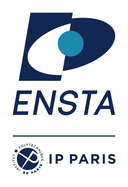
Prérequis pour voie Informatique



Prérequis pour voie Informatique |
 |

Computer Science program prerequisites |
| Félicitations ! Vous êtes admis à venir étudier en voie Informatique à l'ENSTA Paris. Elle est constituée de la majeure Informatique, suivie d'une mineure de votre choix : IAC ou LeCS . | Congratulations! You are admitted to attend the Computer Science program at ENSTA Paris. It consists of the Computer Science major, followed by a minor at your choice: IAC or LeCS (please follow the French links). |
Se
préparer à l'ENSTA
|
Getting
prepared for ENSTA
|
| La voie Informatique, formation de niveau M1 dans les sciences du numérique, se situe en 2ème année du cursus ENSTA. Elle s'appuie sur le programme de tronc commun de 1ère année, d'où certains prérequis pour vous. Ci-dessous sont détaillés ceux qui ont posé des difficultés à vos précédesseurs. Si vous ne remplissez pas ces prérequis, vous devez étudier par vous-mêmes les ressources suivantes (suivre les liens) avant de rejoindre l'ENSTA. | The Computer Science program, which is an M1-level program in ICT (information and communication technologies), takes place in the 2nd year of the ENSTA curriculum. It relies on the 1st year common core program. So there are some prerequisites for you. Hereunder are detailed those that have raised difficulties for your predecessors. If you do not match them, you have to study the following ressources (follow the French links) on your own before joining ENSTA. |
Mathématiques
|
Mathematics
|
|
Les étudiants locaux ont beaucoup
étudié les Mathématiques en 1ère année et auparavant. Plusieurs
cours de voie Informatique y font appel, sur les domaines
suivants (avec les sigles des
cours correspondants) :
|
Local students have a strong
mathematical background and several courses in the Computer Science
program leverage it, on the following domains (with
the corresponding 1st year courses codenames):
|
Informatique
et langages de programmation
|
Computer
science and programming languages
|
Les
étudiants locaux ont une moindre expérience en Informatique
(ils sont débutants en programmation orientée objet). Par contre,
outre des connaissances de base en algorithmique et structure de
données, ils savent programmer en :
|
Local
students have less experience in Computer Science (they are
beginners in object-oriented programming). However, along with basic
knowledge of algorithms and data structures, they are able to
program in :
|